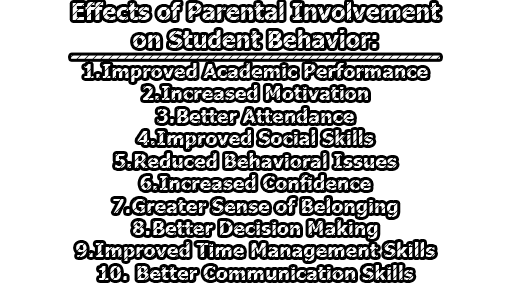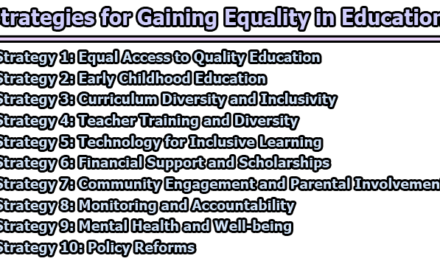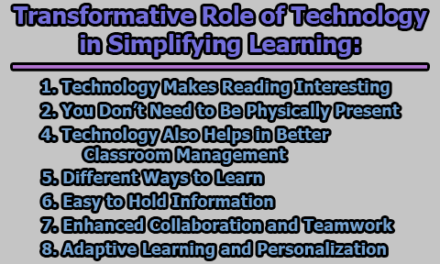Parental involvement has always been a topic of interest for researchers, educators, and parents. The quality and level of involvement parents have in their child’s education play a significant role in their academic performance and behavior. Several studies have been conducted to investigate the relationship between parental involvement and student behavior, and this article aims to explore the effects of parental involvement on student behavior.
Theoretical Framework:
According to the social learning theory, behavior is learned through observation and imitation of others’ behavior. Children learn from their parent’s behavior, which is reinforced through rewards and punishments. The parent’s involvement in their child’s education can act as positive reinforcement and encourage good behavior, while the lack of parental involvement can lead to negative behavior.
The ecological systems theory suggests that individuals are influenced by their immediate environment, including their family, peers, and community. Parental involvement can provide a supportive and nurturing environment, leading to positive behavior and academic success. On the other hand, the absence of parental involvement can result in negative behavior and a lack of academic motivation.
Effects of Parental Involvement on Student Behavior:
Parental involvement in education has been linked to positive student outcomes, including improved academic performance, increased motivation, better attendance, improved social skills, reduced behavioral issues, increased confidence, a greater sense of belonging, better decision-making, improved time management skills, and better communication skills. In this response, we will explore these effects in brief.
- Improved Academic Performance: Parental involvement has a positive effect on academic performance. Research has shown that students whose parents are involved in their education are more likely to achieve higher grades, attend school regularly, and have better test scores. This could be attributed to parents’ active involvement in their child’s homework, helping them understand the material, and providing a supportive environment for learning.
- Increased Motivation: Parental involvement can increase students’ motivation to learn and succeed. When parents show an interest in their child’s education, it can increase their motivation to do well academically. Students who have supportive parents are more likely to set academic goals, work hard to achieve them, and take responsibility for their learning.
- Better Attendance: Parental involvement can also lead to better attendance rates. When parents take an interest in their child’s education, they are more likely to ensure that their child attends school regularly. Parents can also communicate with teachers to address any attendance issues and work with their child to ensure they understand the importance of attending school.
- Improved Social Skills: Parental involvement can help develop students’ social skills. When parents are involved in their child’s education, they are more likely to participate in extracurricular activities, such as sports or clubs. This can help students develop social skills, such as teamwork and communication, which are essential for success in school and beyond.
- Reduced Behavioral Issues: Parental involvement can also help reduce behavioral issues. When parents are involved in their child’s education, they can monitor their behavior and intervene when necessary. This can help prevent negative behavior, such as bullying or skipping school, and promote positive behavior, such as respect for authority and responsibility.
- Increased Confidence: Parental involvement can increase students’ confidence. When parents are involved in their child’s education, they can provide positive feedback and encouragement. This can help students feel more confident in their abilities and more willing to take risks and try new things.
- Greater Sense of Belonging: When parents are involved in their child’s education, it can help the child feel a greater sense of belonging. This is because the child sees that their parents value their education and are invested in their success. This can help the child feel more connected to their school and more willing to participate in school activities.
- Better Decision Making: Parental involvement can also help students make better decisions. When parents are involved in their child’s education, they can provide guidance and support when their child is facing a difficult decision. This can help the child make better choices, both in and out of school.
- Improved Time Management Skills: Parental involvement can also help students develop better time management skills. When parents are involved in their child’s education, they can help the child prioritize their tasks and manage their time effectively. This can help the child be more organized and focused, leading to better academic performance.
- Better Communication Skills: Parental involvement can also help students develop better communication skills. When parents are involved in their child’s education, they can model effective communication skills and encourage their child to communicate effectively with teachers, peers, and other adults. This can help the child develop important life skills that will serve them well in the future.
It is apparent that parental involvement has a significant impact on student behavior. Students whose parents are involved in their education are more likely to have better academic performance, attendance, motivation, social skills, and confidence. On the other hand, the absence of parental involvement can lead to negative behavior and a lack of academic motivation. It is, therefore, essential for parents to take an active role in their child’s education and work with teachers to promote positive behavior and academic success.
References:
- Epstein, J. L. (1995). School/family/community partnerships: Caring for the children we share. Phi Delta Kappan, 76(9), 701-712.
- Henderson, A. T., & Mapp, K. L. (2002). A new wave of evidence: The impact of school, family, and community connections on student achievement. National Center for Family & Community Connections with Schools.
- Desforges, C., & Abouchaar, A. (2003). The impact of parental involvement, parental support, and family education on pupil achievement and adjustment: A literature review. The research report RR433. Department for Education and Skills.
- Fan, X., & Chen, M. (2001). Parental involvement and students’ academic achievement: A meta-analysis. Educational Psychology Review, 13(1), 1-22.
- Hoover-Dempsey, K. V., & Sandler, H. M. (1995). Parental involvement in children’s education: Why does it make a difference? Teachers College Record, 97(2), 310-331.
- Jeynes, W. H. (2007). The relationship between parental involvement and urban secondary school student academic achievement: A meta-analysis. Urban Education, 42(1), 82-110.
- Driessen, G., Smit, F., & Sleegers, P. (2005). Parental involvement and educational achievement. British Educational Research Journal, 31(4), 509-532.
- Hill, N. E., & Tyson, D. F. (2009). Parental involvement in middle school: A meta-analytic assessment of the strategies that promote achievement. Developmental Psychology, 45(3), 740-763.
- Domina, T. (2005). Leveling the home advantage: Assessing the effectiveness of parental involvement in elementary school. Sociology of Education, 78(3), 233-249.
- Sui-Chu, E. H., & Willms, J. D. (1996). Effects of parental involvement on eighth-grade achievement. Sociology of Education, 69(2), 126-141.

Library Lecturer at Nurul Amin Degree College










